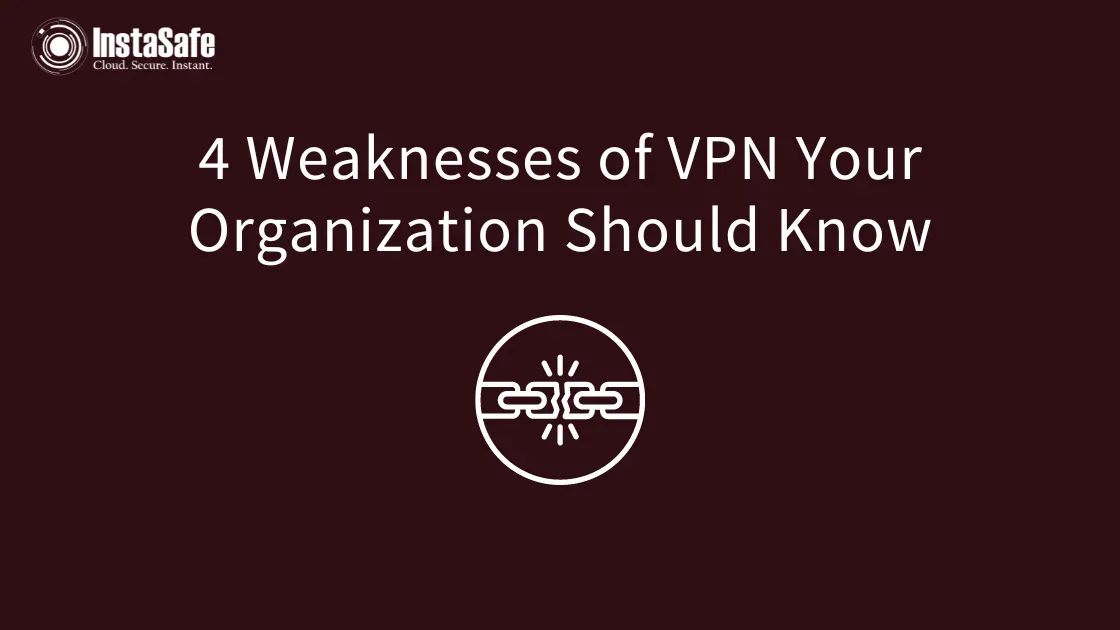4 Weaknesses of VPN Your Organisation Should Know

A Virtual Private Network has been a common and quite popular solution adopted by organisations to meet their remote working needs and requirements.
Remote employees and third-party vendors, like contractors, need a secure solution to access the company's network, resources, and applications. While VPN can help here, it isn't ideal for a large-scale remote organisation and also comes with many security risks and vulnerabilities.
Thus, there are multiple pros and cons to using a VPN for remote access.
In this article, we'll see the four major VPN security weaknesses for your organisation and an ideal VPN alternative for the same. Let's go!
Disadvantages of Using VPN for Your Organisation
VPNs aren't designed to cater to the needs and high demands of the modern workforce and the increasing cybersecurity risks.
Here are the major VPN disadvantages and weaknesses you must be aware of before opting for your organisation's secure access needs.
VPNs follow excessive implicit trust
Unlike modern and secure VPN alternatives, VPN allows every user entry within the network, which is the biggest weakness of VPN when it comes to ensuring network security.
Because of its perimeter-based security access, it assumes every user to be safe and trustworthy, making it easier for hackers and malicious entities to get into your network and exploit critical network data and resources.
Thus, VPNs might be good for accessing the internal network when the employees are within the office premises, but it doesn't offer much security for remote access.
VPNs lack agility and scalability
VPNs aren't the most scalable and agile security solutions when your team is growing, and you need to add new devices and employees to the network regularly.
Because of the redundant security stacks, VPNs get difficult to scale and even increase the management complexity and operational maintenance costs. Thus, the more you try to scale your VPN environment, the more complex and expensive your network and VPN deployment gets for your organisation.
You need to set up each device or user to the VPN Client and integrate them into the access control system, which gets highly cumbersome and complex.
So, if you own a large employee team and need a scalable remote access solution, VPN isn't the right choice.
VPNs increase the attack surface
Another major enterprise VPN security weakness is that VPNs work on the castle-and-moat security approach. It means anyone within the company network can easily access all the resources, systems, and applications.
This open network access increases the network's attack surface and the chances of data breaches and security threats.
So, if a malicious hacker manages to get into your network or system, it immediately exposes all the network's applications, making VPNs the least secure service for modern enterprises. Moreover, adding additional security layers to prevent this situation increases the complexity and budget for organisations.
VPNs hamper the network and user performance
VPNs cannot handle and effectively manage heavy loads and user requests for an extended period.
When you try to connect global employees to the remote company network and its applications using VPNs, it results in unstable and slow connections and the backhauling of the user data traffic.
This slow speed and performance degradation lead to latency issues and an impeded network connectivity, significantly hampering the employee's performance and productivity.
Zero Trust: An Ideal VPN Alternative
So, if you wish to overcome these drawbacks of VPNs with a secure, scalable, and reliable VPN alternative, go for Zero Trust Security for your organisation's secure access needs.
Zero Trust rely on the principle of ''Never Trust, Always Verify,'' only allowing authenticated and authorised devices and users to access the network.
Here are the benefits of Zero Trust Security over VPNs:
- Implements strict user verification and authentication before network access instead of excessive trust.
- Provides granular access control over who can access what network resources through least privilege access, eliminating the risks of data breaches.
- Prevents lateral movement and ensures maximum network security.
- Prevents latency and backhauling issues with seamless scalability, boosting performance and user productivity.
- It's a cost-effective solution for seamless and secure remote connectivity for users and employees.
Conclusion
While VPNs may manage to offer a stable network access solution for small-scale needs, they aren't the most reliable, secure, and scalable solutions for large-scale remote access requirements of modern organizations.
They increase the attack surface, come with scalability and management complexity, make your network slow, and affect the user experience. On the other hand, a Zero Trust Security solution eliminates all these issues, proving to be a secure access solution.
It lets you experience high performance, security against data breaches and cybersecurity attacks, an agile and scalable environment, and greater employee satisfaction and experience.
So, if you're looking for a VPN alternative for your organisations scaling needs, make sure to check our InstaSafe solutions. We offer a security solution that upgrades your network's security posture with your company's best remote and cloud-ready Secure VPN Alternative. Book a demo today!
Key Products
Multi Factor Authentication | Identity And Access Management | ZTNA | Zero Trust Application Access | Secure Enterprise Browser
Key Features
Single Sign On | Endpoint Security | Device Binding | Domain Joining | Always On VPN | Contextual Access | Clientless Remote Access | Device Posture Check
Key Solutions
VPN Alternatives | DevOps Security | Cloud Application Security | Secure Remote Access | VoIP Security
